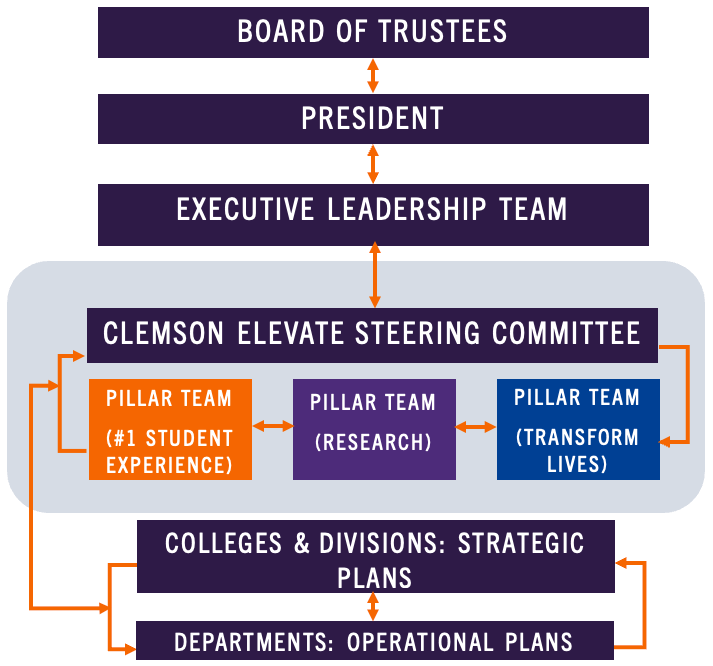Strategic Prioritization
With the launch of Clemson Elevate in April 2023, the Clemson University Board of Trustees set an expectation that the University would create a structure to execute the strategic plan.
Our team recognized the need for an implementation and prioritization system to increase the value and alignment of individual efforts across all colleges and divisions while ensuring broad and transparent communication both vertically and horizontally throughout the University. The Clemson University Board of Trustees provided the following guiding principles for developing a strategic prioritization framework.
Guiding Principles
Structured yet Flexible
Allows for agility to respond to new and unexpected opportunities.
Transparent Communication
Efficient with both horizontal and vertical integration.
Inclusive
Ensures buy-in and thorough vetting by soliciting broad expertise.
Action and Results Oriented
Drives action and accountability for continuous improvement.
Clemson Elevate Pillar Teams
Three Pillar Teams were formed as self-governing committees to support Executive Leadership and charged with:
- Reviewing enterprise risks or institutional-level challenges and barriers that will prohibit the success of Clemson Elevate. Pillar teams are tasked with identifying and supporting projects related to and mitigating identified risks. This will help ensure success in aligning University priorities and limited resources.
- Understanding colleges and divisions' strategic plans to help identify potential areas of collaboration across the University.
- Monitoring and reporting on institutional-level strategic projects to leadership.
Pillar Champions lead pillar teams by bringing an institutional lens and communicating with the designated pillar. They will also lead and review all communication as it relates to the progress of the Clemson Elevate priorities. Their names are in bold below.
-
#1 Student Experience
- Sean Brittain - Dean, Undergraduate Learning
- John Lopes - Dean, Graduate School
- Doug Hallenbeck - Vice President for Student Affairs
- Sarah Winslow - Dean, Honors College
- Ann Marie Alexander - Corporate Partnerships
- Denise Anderson - College of Behavioral, Social, and Health Sciences
- Abby Baker - QEP – Experiential Learning/Academic Affairs
- Michelle Cook - College of Education
- Dhaval Gajjar - College of Art, Architecture, and Construction
- Mandy Hays - Student Affairs
- Thompson Mefford – College of Engineering, Computing, and Applied Sciences
- Kimberly Poole - Student Affairs
- Darbi Roberts - College of Veterinary Medicine
- Melissa Smith - College of Engineering, Computing, and Applied Sciences
- Timothy Stanfield - Community, Engagement, Belonging and Access
- Marieke Van Puymbroeck - Graduate School
- Calvin Williams - College of Science
- Kyle Young - Athletics
-
Research Ascension
- Tanju Karanfil - Senior Vice President Research
- Amy Lawton-Rauh - Academic Affairs
- Dan Noneaker - College of Engineering, Computing, and Applied Sciences
- Paula Agudelo - College of Agriculture, Forestry, and Life Sciences
- CC Bates - College of Education
- Amit Bein - College of Arts and Humanities
- Mark Cothran - Governmental Affairs
- Stephen Creager - College of Science
- Bryan Miller - College of Behavioral, Social, and Health Sciences
- Winnifred Newman - College of Art, Architecture, and Construction
- Windsor Sherrill - PRISMA Associate Vice President, Health Research
- Jennifer Siemens - The Wilbur O. and Ann Powers College of Business
- Kendra Stewart-Tillman - Community, Engagement, Belonging and Access
- Tracy Walters - Grants and Contracts Administration
-
Transforming Lives
- George Askew - Academic Affairs
- Julio Hernandez – Community Engagement
- Angie Leidinger - Vice President, External Affairs
- Scott Baier - The Wilbur O. and Ann Powers College of Business
- Ed Bowers - College of Behavioral, Social, and Health Sciences
- Lara Browning - College of Art, Architecture, and Construction (Architecture)
- David Clayton - Corporate Partnerships
- Michelle Cook - College of Education
- Tom Dobbins - Public Service Activities
- Dianne Dunning - College of Veterinary Medicine
- Lili Gehring - College of Science
- Anand Gramopadhye - College of Engineering, Computing, and Applied Sciences
- Leslie Hossfeld - College of Behavioral, Social, and Health Sciences
- Amber Lange - Community, Engagement, Belonging and Access
- Carolyn Phinizy - College of Arts and Humanities
- Loir Rennert - College of Behavioral, Social, and Health Sciences

Annual Prioritization Process
An annual prioritization process supports the strategic planning and execution framework for the University. This process includes front-line engagement through the Pillar Teams and Executive Leadership.
Clemson Elevate has 35 actions, and to provide the best results, pillar teams and leadership set priority focus areas on an annual basis. These priorities cascade down to operational plans within Colleges & Divisions to ensure alignment of individual activities. Below is an infographic of this timeline.
